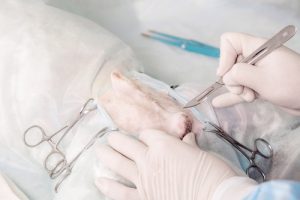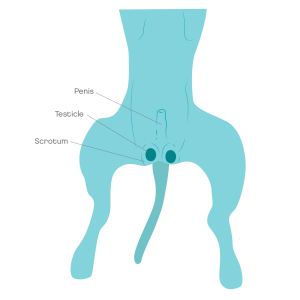Castration of dogs has many health benefits, including preventing them from being able to reproduce. This routine surgical procedure also helps reduce the dog overpopulation crisis. The number of puppies born every year is still far greater than the number of good homes that can be found for them.
Castration is a surgical procedure where the testicles are removed from a male dog. To determine the best age for this surgery, a 6 month checkup is recommended. It can also be called neutering or surgical sterilisation. After surgery, keep your dog with his buster collar and do not let him lick the wound.

What it’s for
Why is this procedure recommended?
Your vet may recommend this surgery for your male dog to prevent or treat the following conditions:
- Treat or reduce the chance of prostate disease. Including enlarged prostate disease that comes with age and prostate infection.
- Remove the chance of testicular cancer (tumours) and other testicular diseases.
- As part of the treatment for perianal adenoma (lumps around the anus).
- To treat cryptorchidism. A condition in which one or both testicles did not descend into the scrotum. If not removed with surgery, these testicles are more likely to develop cancer.
- It helps to control dog population.
- Reduces the urge to find a female dog for mating.
- Can reduce behaviours such as humping.
Having your dog castrated before he exhibits this kind of behaviour is more effective than after the behaviour has already started.

How it’s done
What are the options for castration in dogs?
Surgery
An operation is performed to remove the testicles. A surgical incision is usually made on the tummy below the penis. Followed by the removal of the testicles, leaving the scrotum. The length of the incision depends on the size of your dog.
Chemical castration
A short-term castration using a small implant under the skin that will release a synthetic hormone that suppresses the dog’s fertility. It lasts either 6 or 12 months, meaning that it’s reversible. It doesn’t require anaesthesia. It can still have side effects. Speak to your vet if you want to know more about this option.
What happens on the day of the castration surgery?
Before the surgery day:
- Your dog should have had a pre-neuter check with a vet or a nurse
- Your dog should be starved from the night before the operation
- You can still leave water available
- Make sure your dog is clean before the day of the operation
- Take your dog out to the toilet before you arrive at the vet
In practice:
- A vet or a nurse will admit your dog
- Then the vet will do a hands-on examination to make sure it is ok to go ahead with the operation
- When necessary, pre-anesthetic blood tests will be performed
- Then a sedative and pain relief will be injected
- While the pre-anaesthetic is working, your dog will be kept in a calm, warm kennel
- Once the sedative has taken effect, your dog will be put under a full/general anaesthetic
- In preparation for surgery, the skin is cleaned and clipped while your dog is closely monitored
- Surgery will begin
Soon after surgery:
- After your dog wakes up from the anaesthesia, he will be placed in a warm, comfortable kennel to recover
- Usually, your dog can go home a few hours after their operation, but if they take longer to recover from anaesthesia, they may need to be monitored for longer
- You will take home pain-relief. You may find your dog more quiet or disoriented on the day they get home
Costs
Why do different places charge different prices for castration surgery?
Cost depends:
- On the type of surgical technique
- If one or both testicles did not descend into the scrotum a different surgery technique is required to find them and remove them
- Type of anaesthesia monitorization
- Whether pain medication is included or not
- Geographic location of the vet practice
Risks
What are the disadvantages?
Potential disadvantages include:
- Slows their metabolism making them prone to obesity. However, obesity is the result of overfeeding and a lack of physical activity. By regulating your dog’s diet and caloric intake, as well as ensuring daily exercise, you can prevent obesity in castrated or intact males. Speak to a vet nurse for further help.
- Castrating large-breed dogs before bone growth is complete has been associated with an increased risk of cruciate ligament tear (knee injury) and hip dysplasia.
- Castration does not cause a change in personality, intelligence, playfulness, or affection.
- If your dog has a behaviour problem driven by testosterone, it can take up to several weeks for the hormone levels to drop and the behaviour to decrease or stop.
Are there any dangers associated with surgery?
Although castration is considered a routine operation, it still requires general anaesthesia and comes with risks.
Mild complications with the surgical wound or scrotum can occur, such as:
- Bruising
- Swelling
- Infection of the surgical wound
Severe complications, such as:
- Anaesthetic risks: higher if your dog has any other medical issues)
- Bleeding (haemorrhage)
- Surgery can be more difficult in larger or obese pets and is associated with more complications.
Modern anaesthetics and monitoring equipment significantly reduce the risk of complications.
The risk of complications can also be reduced by ensuring your dog is resting as instructed and that they don’t lick the affected areas.
When is the best time to have your dog castrated?
It is recommended to have a developmental checkup or a pre-neuter check at 6 months old.
The general guidelines are:
- Dogs weighing less than 10kg could likely be castrated at 6 months of age.
- Dogs weighing more than 10kg could be castrated at around 14-18 months of age.
- For giant breeds, castration is recommended around 18-24 months of age.
Castration can be done at a later age if necessary.
Recovery tips
How to care for your castrated dog
The recovery period for a routine castration is generally 10 to 14 days. This period may be longer depending on your pet’s age and other health issues.
Aftercare includes:
- Giving painkiller medications prescribed by your local vets
- A buster collar (cone) or pet medical suit may be necessary to prevent licking of the surgical wound
- Strict rest, with no running, jumping, or rough play for 2 weeks following surgery. A castration, even if routine, is still a surgery, and the complications of internal bleeding due to excessive activity can be severe.
- In some cases, your vet may dispense some calming medications
When to worry
When to worry after castration?
Seek vet care if your dog is:
- Bleeding or other discharge from the incision(s)
- Pale gums
- Collapsed
- Laboured breathing
- Weakness (lethargy) that persists more than 24 hours after coming home
- Vomiting, diarrhoea, or loss of appetite that persists more than 24 hours after coming home
- Your pet’s pain does not seem controlled
Joii can help if:
- Bruising around the incision
- Swollen scrotum
- If you cannot keep your dog calm
- If your dog can lick or chew at the incision
- If you have difficulty administering prescribed medication








